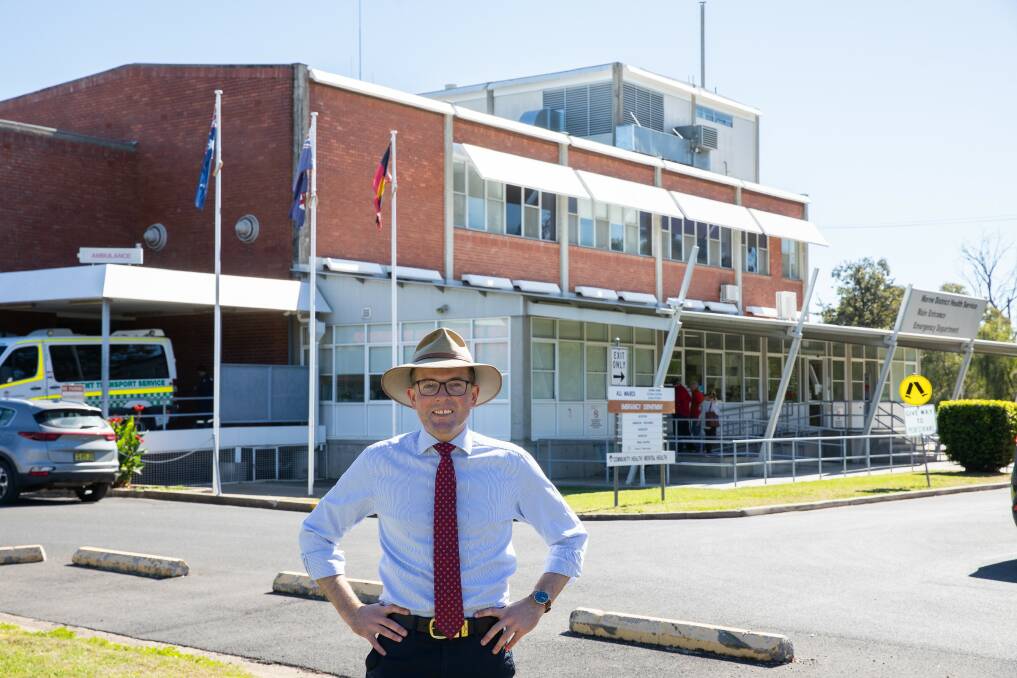
A parliamentary inquiry into regional health in NSW has found the current situation is "unacceptable" and that systemic change is needed.
Subscribe now for unlimited access.
or signup to continue reading
The committee handed down its report last Thursday, making 44 recommendations to address the challenges facing the provision of health services in regional, rural and remote NSW, including a funding model review, recruitment and retention strategies and a renewed focus on workplace culture.
The committee held 15 hearings involving 220 individual witnesses and more than 700 submissions over almost two years, with stories of lack of staff, excessive wait times and medical errors among those heard.
The inquiry has flagged the need for change and local MPs are calling on the government to act as a matter of urgency.
Northern Tablelands MP Adam Marshall has declared he would "fight tooth and nail" to see all recommendations implemented.
"This report is an absolute indictment on the regional healthcare system and vindicates everything the community and I have been saying about the dire lack of health services and resourcing which is putting patient's lives at risk," Mr Marshall said.
"The sad part is none of the recommendations are rocket science - review funding models, increase staffing and overhaul the incentives and training structures to encourage more doctors to work in the bush," he said.
"The government has all the mechanisms at its disposal for total reform; the evidence, a roadmap, a Minister for Regional Health and it will have a Regional Health Division - there are no excuses and I call on it to fully support all recommendations.
"This document leaves no stone unturned and neither will I in my campaign to save what is obviously a health care system in its death throes."
Mr Marshall said it was important recommendations around the training and incentive programs for regional GPs were adopted by State and Federal Government as a matter of urgency.
"We know many issues within the public health system could be addressed by having a greater number of qualified GPs living in rural areas and offering Visiting Medical Officer (VMO) services at our hospitals," he said.
"I fully endorse all recommendations to expedite rural GP training, increase the number of training positions, incentivise relocation and improve overall working conditions for GPs.

"The flow on effects in regards to reduced nurse workload and greater continuity of care for patients will be huge, giving improved coverage from birth to death.
"These changes do however need the Australian Government to pull its socks up and make a greater financial and structural contribution, none of which is happening at the moment."
Mr Marshall said he was particularly pleased with the recommendations targeting the reform of Local Health District structure.
"Not only is this about increasing funding but it is also about addressing systemic managerial failings within our LHDs," he said.
"I welcome any steps which will see greater community involvement and input into the running of LHDs, in particular the revival of the Local Health Advisory Committees.
"If Hunter New England Local health District is to remain in its current form, then we need these bodies at a grass roots level to report and provide feedback on gaps in service delivery.
"The establishment of a Health Administration Ombudsman to review concerns around the administration of LHDs would have a massive job in the current climate but would be an important step in restoring patient confidence in the public health system.
READ ALSO:
Committee chair Greg Donnelly MLC said many of the issues raised in the report were not new.
"While recognising that the provision of health services to an area as large as rural, regional and remote New South Wales is challenging and complex, throughout this inquiry the committee heard repeatedly about individuals and families let down by the health system," Mr Donnelly said.
"The committee heard stories of emergency departments with no doctors; of patients being looked after by cooks and cleaners; of excessive wait times for treatment; and of misdiagnoses and medical errors.
"This evidence is by no means a reflection on the NSW Health staff working tirelessly in challenging circumstances; rather it is an indictment of the health system that has allowed this situation to develop.
"However, the current situation facing the residents of rural, regional and remote New South Wales can and should not be seen as acceptable."
Mr Donnelly said a significant focus on governance, including at the ministerial level, was key to the reforms needed to bring about the necessary systemic change.
"Important recommendations include a review by NSW Health into the current funding models for all rural and regional Local Health Districts in order to identify any service delivery gaps and provide any recommendations for funding increases; the development and implementation of a 10-Year Rural and Remote Medical and Health Workforce Recruitment and Retention Strategy; the establishment of a Health Administration Ombudsman; and a renewed focus on workplace culture within the rural and regional Local Health Districts.
"Other recommendations in the report seek to address issues such as communication and community engagement; remuneration and employment conditions for nurses and midwives; rural training to build the local workforce; the Isolated Patients Travel and Accommodation Assistance Scheme (IPTAAS); the use of virtual care or 'telehealth'; specific improvements for identified sectors including oncology, palliative care and maternity services; and the development of the next Rural Health Plan."
Mr Donnelly concluded that there is "much work to be done across so many areas".
"In order to ensure that focus and momentum for change is not lost, the committee has recommended a further inquiry to report on the progress and developments that have been made to address the matters raised in the report in two years' time," he said.
READ MORE:
The NSW Government welcomed the report on Thursday and will provide a formal response to the parliamentary inquiry within the coming months.
It reaffirmed its commitment to strengthening healthcare in rural and regional NSW, after investing $900 million to rural and regional health capital works in the 2021-22 financial year, followed by a $500 million funding boost in November last year.
Minister for Regional Health Bronnie Taylor said priority areas would include strengthening the rural and regional health workforce; improving access to health services through increased transport and accommodation support; working with the Federal Government to expand and integrate primary care models, including the GP workforce; and to build on community engagement and the understanding of available services in the regions.
Ms Taylor said the inquiry shone a light where it needed to, hearing directly from rural and regional communities, patients, their families and healthcare workers.
"To those who shared their deeply personal experiences, thank you. The NSW Government has listened and accepts that there is a need to do more to improve patient care in regional and rural locations," Ms Taylor said.
"Implementing bold new measures to attract key health workers to work in our regional health facilities and retaining that workforce will be a key focus of mine - everything is on the table when it comes to improving health outcomes in rural and regional NSW."


